Race That Commemorates a Famous Murder - Vinkovci Orient Express
May 5, 2023 - Everyone knows about Agatha Christie's famous novel "Murder on the Orient Express." But did you know that the train which was the scene of the murder was passing right through Vinkovci, on the rails of Slavonia? That train really used to pass there and travel on to exotic places, and Mrs. Christie often traveled on it. And now, just a little slower but equally fun, we're presenting the Vinkovci Orient Express race.
And the second race of the Vinkovci trilogy, which began with the Orion race, was named after the Orient Express, writes Turističke Priče.
Races through the history of the oldest city in Europe
The route of the Orient Express race will explore the streets of Vinkovci on Saturday, May 6. It starts in the city center at 5 p.m., and the length is 10 kilometers.
Pick-up of the start packages is on the day of the race from 4 p.m. and includes the official race shirt, unique start number, finisher's medal, refreshments, and prizes for the first three places in the men's and women's competition. The entry fee is 20 euros, and the announcement of the winners and the awarding of prizes in both categories for the first three places is scheduled for 6.30 p.m., followed by a concert and a DJ performance.
The final treat – Valens Victorius
The Vinkovci race trilogy will end with the Valens Victorius, which will take place on June 18. Valens Victorius is a 4.5-kilometer-long obstacle race. Its name was inspired by the rich Roman history of Vinkovci, where not one but two emperors were born. It is a fun, half-adrenaline race that will decide the overall winner of the Vinkovci trilogy.
This unique and magnificent race in the heart of Slavonia, full of challenges and fun, will be part of the Roman Days, and like every year, in memory of the tragically killed Croatian veteran Nedjeljko Klarić.
At the end of the trilogy, the times of all three races will be added up for the total time for each competitor, and the fastest and most agile will be crowned. The announcement of the overall winners will take place after the completion of the Valens Victorius race on June 18, 2023, at Šokački Stan Vinkovci.
The organizer is the Half Marathon Association, in cooperation with the FCT Citizens' Sports Association. All info about the trilogy and the upcoming Orient Express race can be found here.
Come to Vinkovci, the pride of Slavonia, and take part in this unique race. A city rich with history, which still shapes it, awaits you with a handful of stories about famous characters who created history and lots of sports entertainment.
And don't worry - everyone will leave this Orient Express alive, healthy, and with precious memories of the oldest city in Europe.
For more, make sure to check out our dedicated Travel section.
Novalja, Pag - Cycle on the Moon With the New Bikademy Study
October 21, 2022 - Bikademy, an innovative cycling tourism product, opened a new Study - Novalja, in the northern part of the island of Pag.
Pag is called Moon island for a reason. Its eastern part resembles the surface of the moon, with its landscape stripped by the northern wind Bura. Using the moon as a leitmotif, Bikademy launched the "Cycling on the Moon" campaign, emphasizing that we don't have to travel far to find unique experiences.
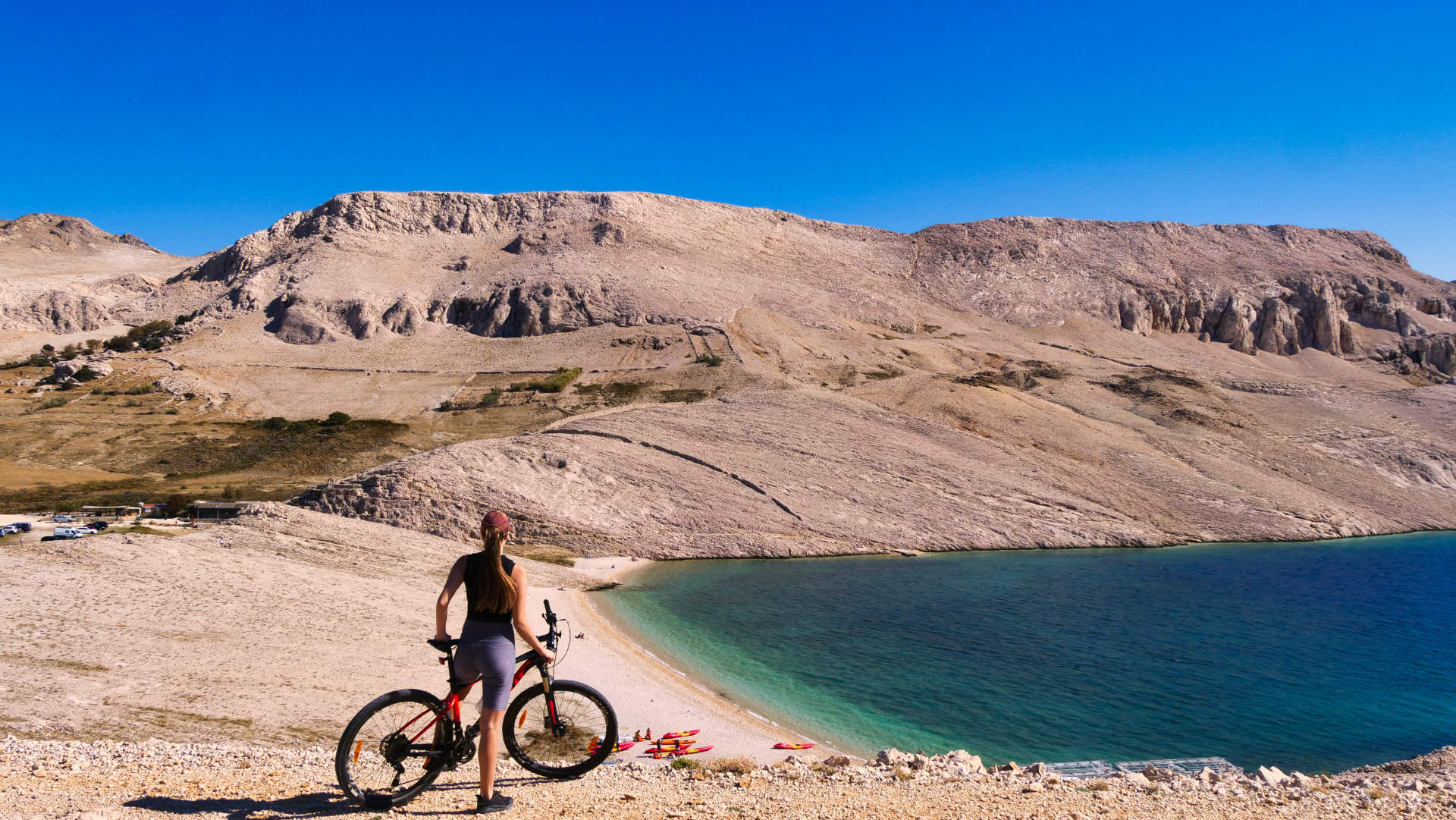
Bikademy functions like an academy whose users are called Bikademy Students. To become a Bikademy Student, you need to download and register on the free Bikademy application. The application offers Studies that represent a specific region or city. Inside each Study, there is a list of Exams, locations within the Study, to which you need to cycle and check in via the application. The course is completed by checking in at each exam, after which Bikademy rewards students with gifts from their sponsor, Giant Croatia.
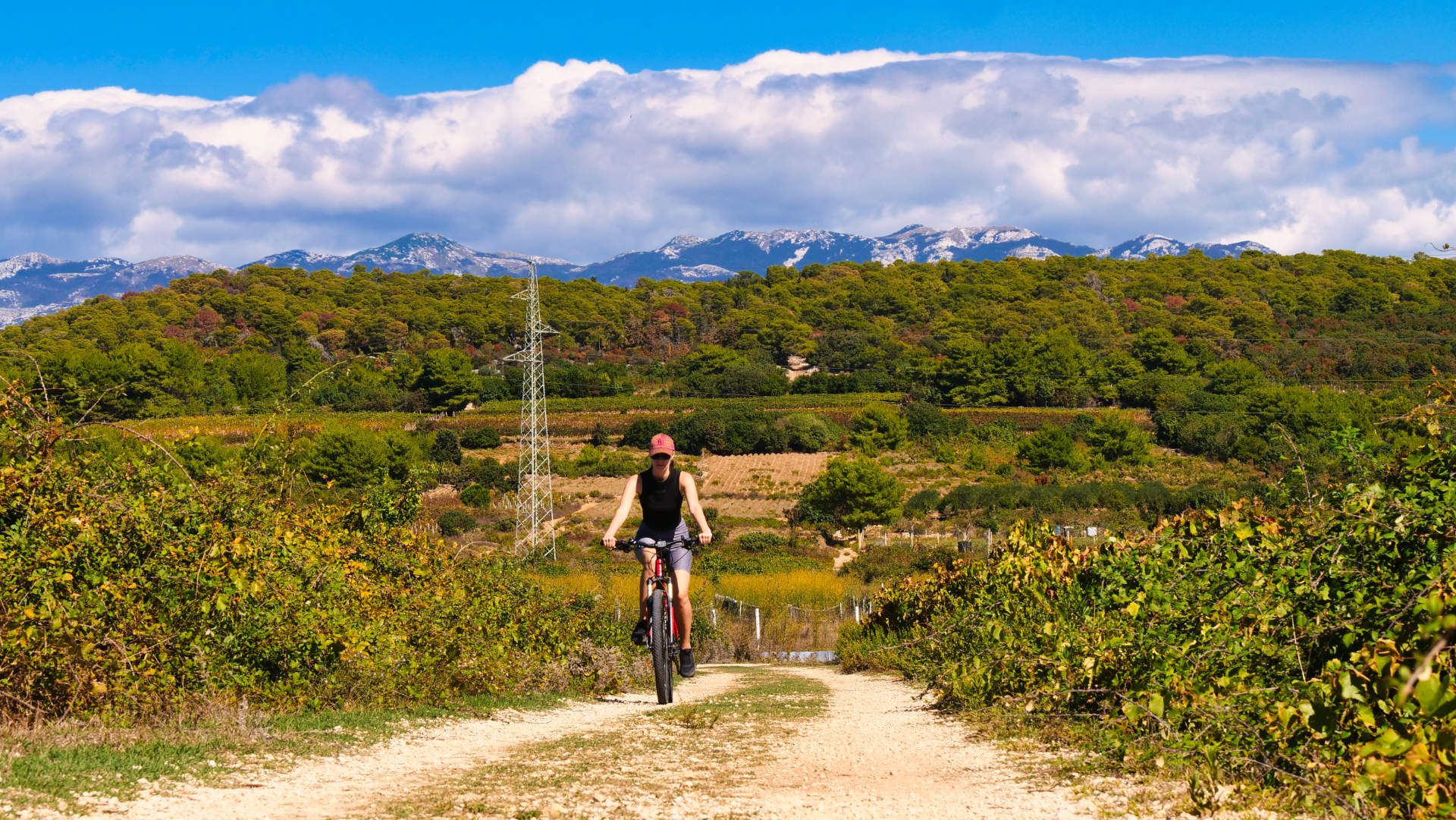
The Novalja study consists of seven exams: the charming town of Lun, the popular Novalja and Zrće beaches, Novaljsko Polje, the incredible Svetojanj fortress, Ručica beach, and Žigljen.
The campaign started with the publication of this video.
Krešimir Herceg, the owner of Bikademy, points out that the bicycle is the ideal means of exploring the destination because it is slow enough to experience the surroundings and fast enough to cover longer distances, which is perfect for exploring the northern part of Pag.
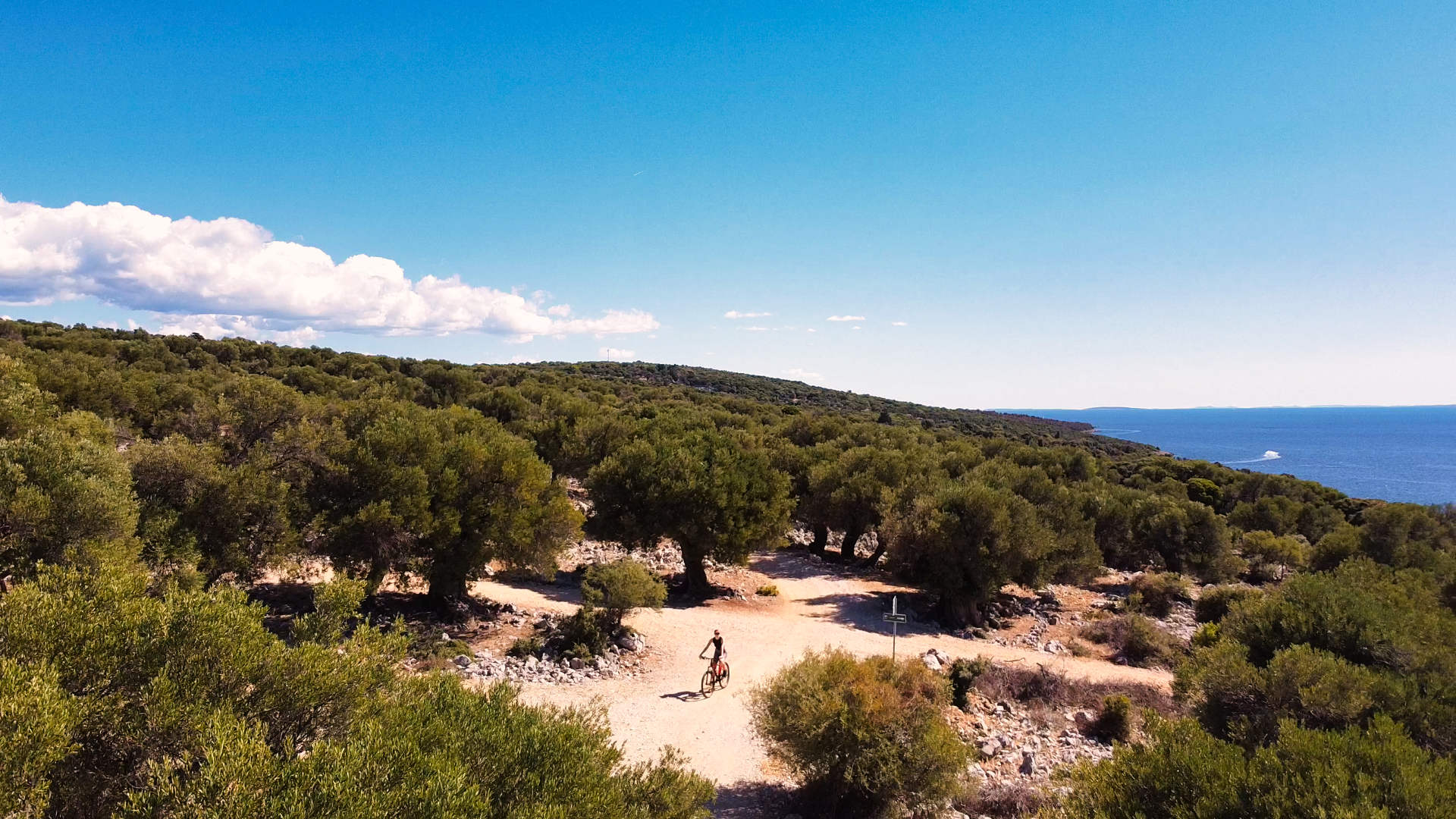
As a product, Bikademy complements the Pag Outdoor project, which brands the destination through outdoor tourism. "With synergy and connection, Novalja forms a new image. In addition to being a party destination, it is also becoming an ideal destination for active tourism, which is evident from the continuous growth in the number of active tourists," added the director of the Tourist Board of the city of Novalja, Marina Šćiran Rizner.
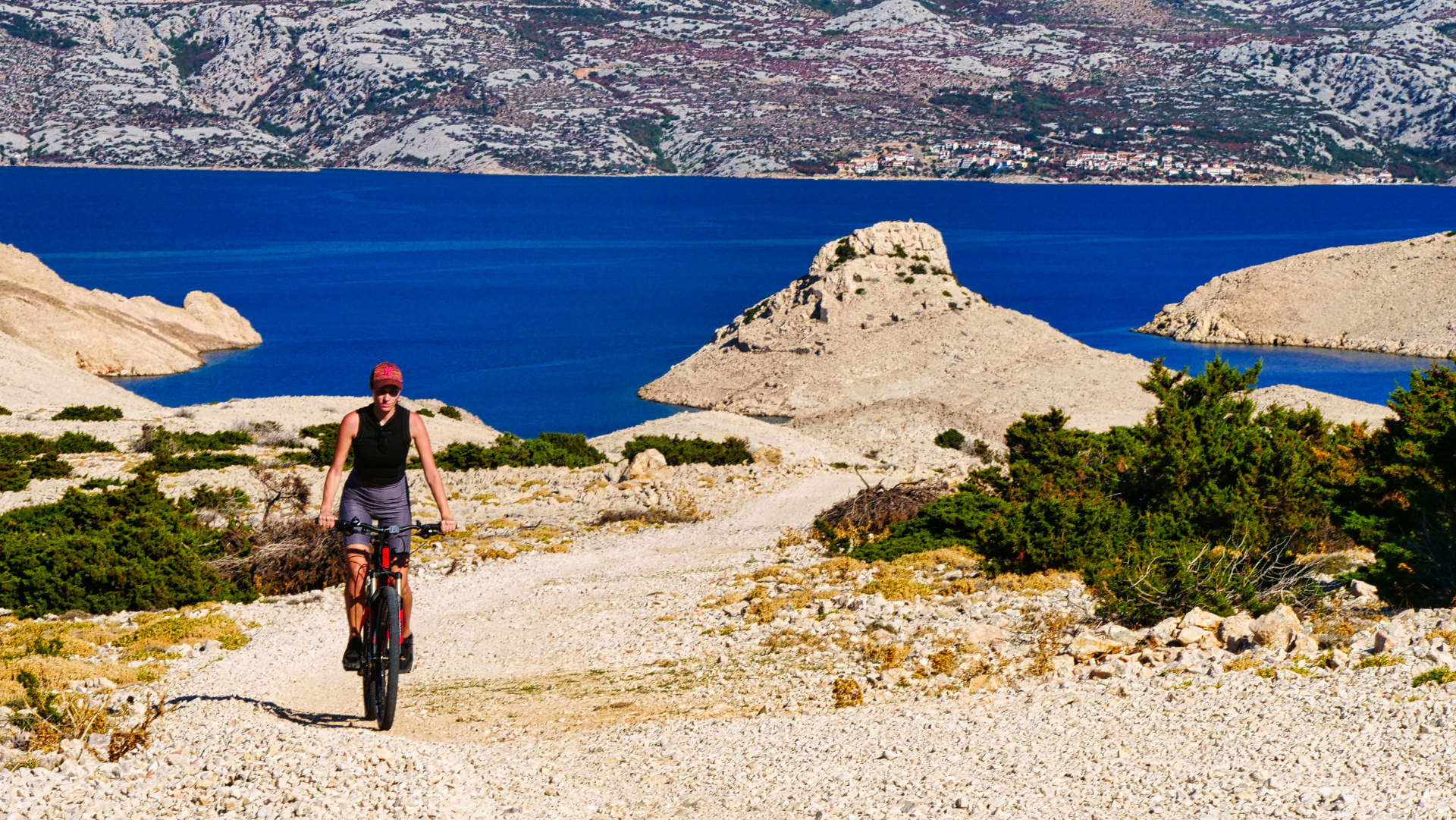
As Bikademy adds, a bicycle is all you need to visit the moon.
The opening of this Study was made possible by the Novalja Tourist Board, PPD, and Enna Grupa, and the rewards, as always, are provided by Giant Hrvatska.
For more, make sure to check out our dedicated Travel section.
Bikademy App Emphasises Potential for Cyclo Tourism in Slavonia
August 3, 2022 - Bikademy – an academy where a good, strong connection is mandatory. The only other requirement is a bicycle. This innovative app explores cyclo tourism and places Croatia on the map of big European cyclo tourist destinations.
Bikademy is a unique Croatian product intended for all those who like cycling to explore new destinations and their cultural and natural heritage. It promotes cities and regions as desirable cyclo tourism destination, rewarding cyclists for their efforts. A bicycle is an ideal means of exploration, being slow enough to take in your surroundings, and fast enough to cover longer distances.
The Bikademy application is completely free for users who, just like in other academies, are called Bikademy Students. Within the application, you can choose from different Bikademy Studies, each representing a particular region, county, or city. Within each Study, there are different Exams, that is, locations and places of cultural or natural significance.
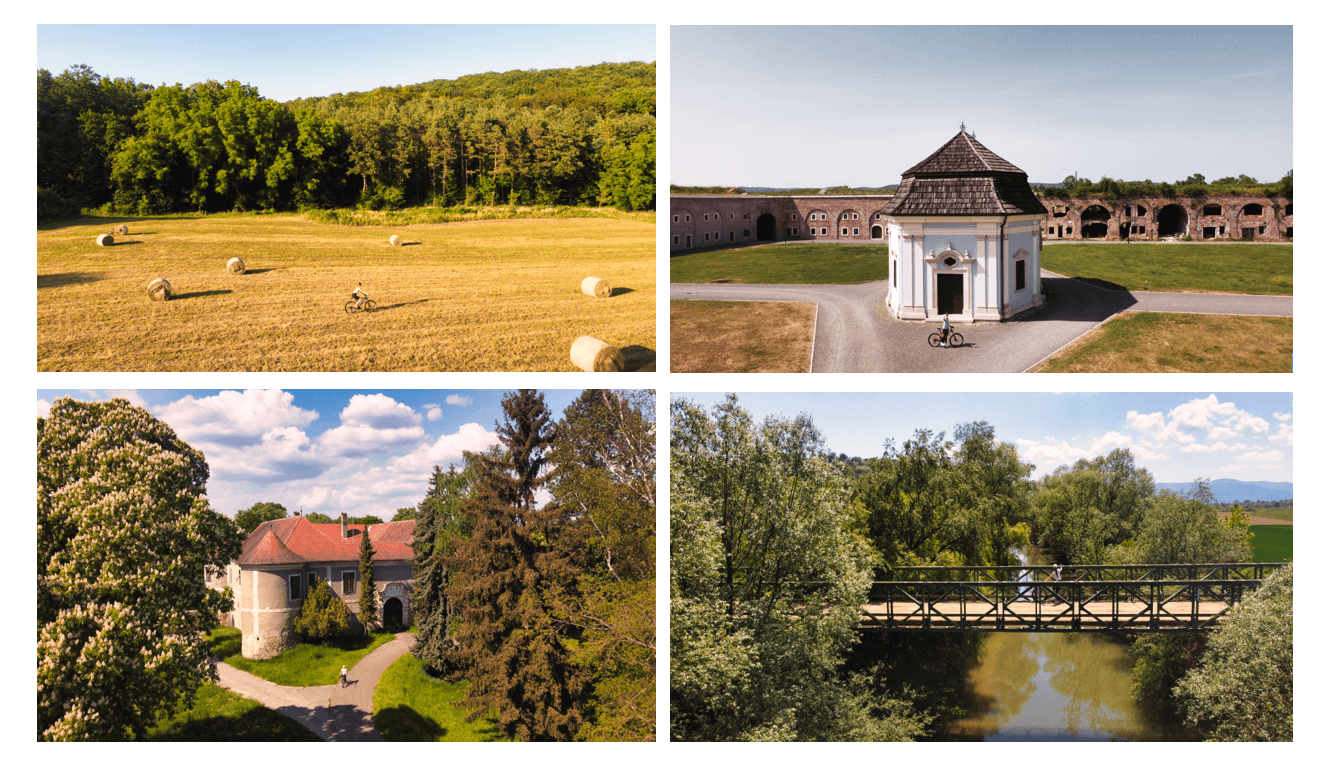
Photo: Bikademy
The main task of a Bikademy Student is to cycle to each Exam in the chosen Study. It is required to take a selfie and check in via the application. After passing all the Exams of the chosen Study, Bikademy Students receive a prize from the Bikademy sponsor, GIANT Croatia.
In just four steps, you too can pass the Bikademy Exam (photos attached).
1 Install the application and register
2 Cycle to the Exam (location)
3 Check in through the application
4 Repeat the previous two steps

Photo: Bikademy
One of the first Bikademy Studies was the Brod-Posavina County with seven Exams: Vrpolje, Gajna, Tvrđava Brod, Petnja, Stara Kapela, Cernik and Tvrđava Stara Gradiška.
Check out the highlights of the Brod-Posavina Study here.
This Study is intended for more experienced cyclists who want to cover longer distances. The Exams are of similar difficulty for the four other four Slavonian counties. They reveal that Slavonia is not only made up of fields and valleys but also rich cultural heritage, natural resources, superb gastronomy and hospitality, at every turn. Although everyone knows about Slavonia, it is yet to be discovered as a hidden tourist gem perfect for cycling.
In cities like Zagreb, Šibenik, and Berlin, there are less demanding Studies for every traveler who wants to explore the area by bike.
Through its social networks, Bikademy presents its cyclo tourism destinations, and examples from practice, but also continuously rewards its followers. They are preparing new surprises and opportunities soon, so make sure you follow them on social networks.
If you would love to see Bikademy in your area, feel free to contact them, as they are expanding beyond the borders of the Republic of Croatia.
As for your holidays, choose your destination and explore it by bike, get to know the culture and nature of the region, and win prizes. Cycle your exams!
To learn more about some of the people behind the movement, check out TCN's interview with Krešimir Herceg.
For more on lifestyle in Croatia, explore our lifestyle section.
Osijek Ferivi Half Marathon on Saturday to Welcome 1,250 Participants from 11 Countries
April 6, 2022 – On Saturday, April 9, the annual Osijek Ferivi Half Marathon will be held, with a range of events for professional and recreational athletes alike.
As SiB writes, the citizens' race and relay race will start at 10.00 am on Ante Starčević Square, while children's races will start at 5.00 pm on the promenade of the upper Drava coast, west of the winter port. A press conference was held yesterday on the central city square in Osijek, the Ante Starčević Square, at which the 18th Osijek Ferivi Half Marathon was announced, a traditional event that will this year take place on Saturday, April 9.
This is the largest and most visited race in the Slavonia and Baranja region, which has been held since 2005 and brings together many athletes, recreationists, and other citizens who want to enjoy running through the streets of Osijek. In addition to the half marathon (21.1 kilometers), there is also a 5km citizens’ race "Are you running, lega?", as well as the men's, women's, and mixed relay races of 3 x 7 kilometres and children's races from 300 meters to 1 kilometer. The organizer of the event is the Marathon Club Hrvatski Sokol from Osijek, and the sponsors are the Osijek-Baranja County, the City of Osijek, the Tourist Board of the City of Osijek, and the Croatian Red Cross.
"The pandemic finally allowed us to gather in large numbers and continue to socialize outdoors through running, cycling, walking, and other sports. I urge our citizens to come to the race because the contemporary lifestyle means a lot of sitting and using cars or public transport, so we need to practice sports. I am sure that everyone who runs the race for the first time will be excited for the next Osijek Ferivi Half Marathon," said the prefect Ivan Anušić.
The citizens' race and the relay race will be starting at 10.00 am on Ante Starčević Square, while the children's races will start at 5.00 pm on the promenade of the upper Drava coast, west of the winter port. More than 1,250 competitors have already registered, not only from Croatia but from 10 other countries (USA, Sweden, Norway, Serbia, Slovenia, Northern Macedonia, Hungary, Germany, Austria, Bosnia and Herzegovina).
The Osijek Ferivi Half Marathon is not just a sporting event, but a combination of sports, entertainment, culture, and tourism, and contributes to the branding of Osijek. What is especially enriching about this event is that not only athletes but also recreational athletes take part, and even more so that children do. The city will continue to support this event", said the mayor of Osijek Ivan Radić.
He added that Osijek cares about its athletes and sports facilities and that this year Osijek will acquire a real Olympic swimming pool (at the Copacabana pools) for the first time, as well as introduce scholarships for athletes of the 5th and 6th categories while striving to raise sports and recreation to a higher level.
The Osijek Ferivi Half Marathon is an event that has been organized by the Marathon Club Hrvatski Sokol since the first race. The Club entered into a partnership with Ferivi & Co d.o.o. in 2008. and the race has since been called the Osijek Ferivi Half Marathon. Last year, the event had a record number of participants and outstanding accompanying content.
To read more about sports in Croatia, follow TCN’s dedicated page.
Women's Football in Croatia: Origins and Status Today
14 March 2022 - Women’s football in Croatia has gone through many changes throughout its history - from being solely a man’s sport to becoming one of the most popular for women worldwide. However, in Croatia, women's football still hasn’t received the traction it has in other countries, and many clubs, especially in Eastern Slavonia, saw an inevitable end. Why has this been happening, and what are the solutions to bring back the lost talents in women’s football? A look into women’s football in Croatia.
Women’s football has had many ups and downs throughout history. From being dismissed as only a man’s sport to its “golden age,” the ban that stopped the sport's progress and, in the end, one of the most significant rises in popularity of any sport in history. The “golden age” occurred in England at the beginning of the 20th century when British men were deployed and sent to the frontline during WWI. According to a BBC Three article from 2016, by 1921, there were around 150 women’s teams in England. A Boxing Day match in 1920 drew in crowds of nearly 70,000. However, after the war ended, women were pushed back to their “places” - closed in the houses to be housewives. In 1921, the “ban” was established, declaring it to be “quite unsuitable for females and ought to be encouraged!”. This “rule” was not lifted until 1971, and unfortunately, the damage has already been done.
If we compare Croatian women’s football history from that timeline, we could say it’s been a bit different. However, even though that sort of ban hasn’t occurred in the established Kingdom of Serbs, Croats, and Slovenes and later the so-called Kingdom of Yugoslavia, reservations about women in football were emphasized a lot. According to Grgic and his article “A Brief History of Women’s Football in Croatia/Yugoslavia in Between War Period,” football was generally open to both sexes. However, “experts” pointed out that women as sentient beings do not need to seriously follow men in sports because those who do it turn into masculine people. Throughout the article, Grgic also mentions multiple instances where football was solely considered for men, and women can only use it as a prop to “get into shape and take it easy because women are fragile.” This puts a lot of factors in perspective if we consider that communist countries (especially after WWII) like Yugoslavia set a significant emphasis on women's rights and their “rightful” part of the “revolution.” Still, even that couldn’t stop discrimination against women. But, once again, that didn’t stop women from playing football. For instance, ŽNK Dinamo-Maksimir is a Croatian women's football club based in Zagreb, and the club was founded as ŽNK Maksimir in 1937. The Yugoslav First Women's League was active between 1974 to 1991 and the fall of Yugoslavia. Zagreb, later called Maksimir, was the only Croatian club in the League, and the club with the most titles was Mašinac from Niš.
After the Homeland War, many Croatian women’s football clubs were founded, which led to the eventual establishment of the Croatian Women's First Football League formed in 1992, following the dissolution of the Yugoslav First Women's League, which is currently underway and features eight clubs.
However, in recent decades, women’s club popularity has not helped the sport's popularity in Croatia, especially in regions like Eastern Croatia. Yes, ŽNK Osijek is the most successful Croatian club in the country, but it didn’t help the inevitable shut down of multiple women’s football clubs, especially in Vukovar - Srijem county.
For instance, out of ten active women’s football clubs in the last two decades, only five of them stayed active with ŽNK Mikanovci, NK Dilj Vinkovci, and Graničar Županja mainly operating in Croatian Women’s Second League. The rest of them work only in younger categories. Displacement of the population, lack of children, and girls' disinterest in the sport made clubs shut down. Girls who wanted to play football had to go to other towns and clubs that were still active, and the best would go to ŽNK Osijek.
Also, most Croatian women’s football clubs pay miserable salaries to their players who are just too low for today’s living standards, whereas in lower league clubs' wages are just non-existent. However, in recent years there has been progress, namely in the infrastructure of the Leagues and clubs, possibilities of the clubs to pay to their players, and constant promotion of women’s football games. It made everything so much easier because of social media and an overall rise in the sport's popularity internationally.

Out of ten clubs, five of them shut down in recent years, and the rest of them are mainly operating in younger categories - Screenshot: Wikipedia
*ugašen (shutdown) *djeluje u mlađim kategorijama (operating only in younger categories)
After the ban was lifted in the UK, women’s football finally progressed. Leagues and football clubs were founded, and the first World Cup in 1991 in China was finally held. In recent times, FIFA World Cup in 2015 and 2019 reached new heights in popularity and brought unprecedented ratings, which could be compared to Olympic Games. Women’s football is now a rapidly growing sport that finally started getting an influx of money and popularity long ago.
Croatian FA recently joined the UEFA Playmakers program, which was created with Disney. The project's primary goal is to introduce football to girls aged 5 to 8 who never experienced playing sports. The program will take place in 2022 and 2023, and four editions will be organized. The first edition - in March 2022 - will follow the animated film Frozen 2. The training will take place on the fields and/or in the halls of women's football clubs so that girls can join the clubs and continue playing football after participating in the UEFA Playmakers program. This project will also include cities all over Croatia and help promote the sport to girls across the country.
In conclusion, after everything researched, we can say that the rise of women’s football in Croatia is inevitable. Of course, it will take a long time since nothing can be done in one day, but positive times are here. Croatian Women’s Football Leagues are slowly but surely developing talent. The Croatian National Team is playing in playoffs for multiple big tournaments, and I don’t doubt that they will one day qualify. The interest in the game is rising again - even though many clubs shut down, girls are once again willing to play football, and rightfully so, because it’s our game too - a women’s game.
To read more about sport in Croatia, follow TCN’s dedicated page.
Friends of Croatia: Japanese Embassy - Friendly Relations between Croatia and Japan
June 17, 2021 -The eighth article in the series, "Friends of Croatia: Japanese Embassy", saw TCN reporter Ivor Kruljac sit down with Japanese Ambassador Misako Kaji and discuss all things regarding diplomatic relations between Japan and Croatia. Overall, Croatia and Japan are friendly countries with many shared values. With Croats and their expertise in improvisation and the excellent crisis response of the Japanese, the two countries can benefit greatly by learning from each other.
Croatia and Japan officially established diplomatic relations on March the 5th, 1993.
I was nervous while the taxi drove me to the Ambassador's residence. Japan is known for punctuality, and I worried whether or not I'd manage to make it on time as my cab was trying to break through Zagreb's midday rush. But in the end, I managed to arrive ahead of schedule. It was great that I wasn't late, but that's still clearly a very far cry from the punctuality of a country where a train conductor apologised when the train left the station 25 seconds ahead of schedule.
As I was rewinding the questions I had prepared in my head, I thought about greeting my interlocutor-to-be. Handshakes are a bit of a risky thing due to the coronavirus pandemic, but even if that annoying virus was somehow erased from existence, in Japanese culture, people would still greet each other by bowing. Do I need to bow, or does the Ambassador need to follow the Croatian culture of handshaking (or perhaps bumping fists in these pandemic-dominated times)?
Cultural Attache, Yutaro Nishida welcomed me to the premises, and at last, introduced me to the Japanese Ambassador Misako Kaji, who welcomed me with a smile, respect, and kindness. The debate on whether to bow or fist-bump was resolved by doing both, with both sides respecting and accepting each-others cultural background. For safety, I kept my mask on while the Ambassador removed hers so that her voice could be more clear as the interview was recorded. I moved my mask only occasionally to drink the amazing traditional green tea that was served during the interview, which was paired well with a warm and friendly atmosphere from the official representative of Japan in Croatia.
Misako Kaji graduated with a BA in the economy at the University of Tokyo, followed by an MA in philosophy, politics, and economy at no less than Oxford University. Inside the Japanese Ministry of Foreign Affairs, she served in the Japanese Embassies in the UK and Vietnam, but also in Japanese EU and UN missions. As an Ambassador and deputy of the main representative, Kaji also served in Japan's Delegation to international organisations in Geneva. In Japan, she was the deputy spokesperson for the Japanese Prime Minister and was a professor at the Tokyo and Hitotsubashi Universities. Ambassador Kaji also has quite some experience with the United Nations (UN). She was a special advisor of the high committee of the UN Refugee Agency (UNHCR) as well as a member of the UN Advisory Committee on Administrative and Budgetary Questions and a member of the advisory committee of the UN Peacebuilding Fund. She has represented Japan in Croatia since May 2019. Two years and twenty days, as she stated on the day of the interview that occurred last Friday.
Japanese culture is beloved in Croatia
''If you'd asked me a year ago, I would've said the Adriatic sea, the scenery, and the colour blue, all of these wonderful UNESCO heritage sites and nice people ready to help when you're travelling,'' started Ambassador Kaji, explaining what she had found most interesting and impressive in Croatia.
''But, after two years, I have something more to say, and what I like about Croatia is the 'Japan' I encounter in Croatia, and that is a very positive discovery. I didn't realise Japanese culture was so widely embodied in a variety of Croatian minds,'' noted ambassador Kaji.
The most recent instance was last week's handover ceremony of the Foreign Minister's Commendation to the Croatian Origami Society, which took place at the Ambassador's residence. Some of the members have been engaged with this artistic papercraft (taught in Japanese kindergarten) for over 20 years now.
''They are very much interested and dedicated without being imposed or forced to be, and its members included chemistry students, medical doctors, and even an 11-year-old boy. There were so many different categories of profession, and some even folded Origami while on probation, and that is where they'd encountered the art of origami,'' continued the Ambassador, fascinated with such love for one of the essentials of Japanese culture, keeping hold of plenty of works donated by participants of the ceremony.
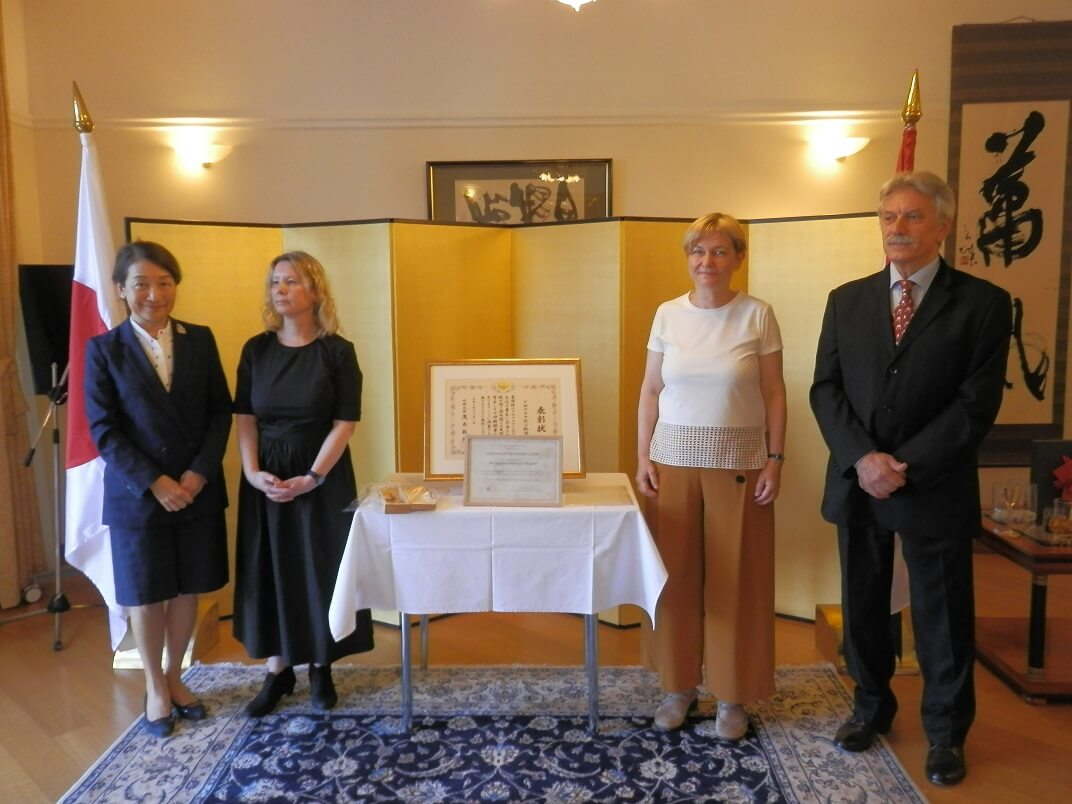
The handover ceremony of the Foreign Minister's Commendation to the Croatian Origami Society, June 2021 © Japanese Embassy Croatia
She is also particularly delighted with Biograd na Moru, a Croatian city in the Zadar area that not only commemorates the Atom Bomb falling on Hiroshima and Nagasaki but also has a metal crane bird as a monument to this dreadful tragedy that occurred on August the 6th, 1945.
''There is a legend that cranes live for a thousand years, so they are often used as presents for somebody who has been met with disasters or illness. In Hiroshima, they have a thousand cranes (made in the origami technique) folded and presented for the wish of peace,'' explained the Ambassador. Such a ceremony was also seen in Biograd na Moru, initiated by mayor Ivan Knez with a large metal crane made to outlast paper for generations to come.
The Japanese martial art of Karate is also popular in Croatia with some quite good successes achieved by Croatian athletes. Last month, the European Karate Championships were held in Poreč, where Ambassador Kaji was invited and was again fascinated with the use of the Japanese language and overall traditions despite there not having been a single Japanese athlete present there.
With so much of Japanese culture being present here in Croatia, it's difficult to say what the most beloved aspect of Japanese culture is for the Croats.
Before the pandemic struck, Ambassador Kaji remembered the Japan Day event in Zagreb's popular Mimara Museum, which saw huge attendance and a presentation on Japanese food, sake (Japanese rice schnapps) degustation, Ikebana (flower art), a tea ceremony, bonsai (aesthetical horticultural shaping of small trees), martial arts such as Karate, Judo, Kendo, haiku poetry workshops, calligraphy, Igo chess and much more.
2019 was also a big year for a Japanese promotion with the 2020 Olympic Games, which saw Croatian athletes from the 1964 Olympics attend the promotion for 2020. Additionally, for Japan, as Ambassador Kaji pointed out, the Paralympic Games are an important measure for the general success of the Olympics, which was evident in the ParaBOX installation (where visitors were challenged to find a ball in complete darkness), and the presentation of the Japanese car company Toyota's car which is designed to be able to be driven by people with disabilities.
However, when it comes to younger people, particularly students of Japanology (which Croats can study at either Zagreb or Pula University), one cultural trend emerged.
''The Japanese language is very tricky to learn, so I asked one graduate student how she first encountered Japan and heard the language, and it was anime,'' Ambassador Kaji recalled. She added that the Japanese cartoon art of anime became pretty universal and is no longer limited only to Japan. (The same goes for Japanese comics such as manga, with both of these pieces of pop culture being incredibly diverse in genres and having something for everyone, covering all social groups and even not avoiding vivid graphic images of violence and/or sex).
''At the Foreign Ministry of Japan, we have an award from a world competition because of the promotion of manga, but without trying to focus or push deliberate energy into that promotion,'' stated Ambassador Kaji.
As Japanese pop culture, anime and manga are indeed very popular here in Croatia, which is visible at the Pandakon conference that is held annually at Zagreb's Močvara club. Fans often dress up as their favourite characters, and there are often rewards for the best cosplay.
However, there are also heated debates between fans and people in the manga/anime industry that also affect Croats. On the one hand, representatives of the anime and manga industry are unhappy with cosplay, viewing it as a copyright infringement and believing that fans should be paying for cosplaying these characters. On the other hand, fans say they are just trying to show love and appreciation for their work, and they are also promoting and attract new audiences. It's indeed true that someone might not know what is ''Deadman Wonderland'', but upon seeing a brilliantly crafted cosplay of Shiro, they may ask the cosplayer about the character and then watch anime or read manga.
Ambassador Kaji says the Japanese Government is aware of the problem.
''Earlier in January, the Minister for the "Cool Japan“ Strategy (with Cool Japan being a brand strategy, aiming to disseminate Japan's attractiveness and as a unique culture throughout the world), Shinji Inoue said that he was aware of an opinion among the cosplay community rising, and this could be a real legal problem. It was important to secure an environment in which people can enjoy cosplay at ease, without worrying about possibly breaching laws. So, the Minister declared that he would come up with ways to deal with it but has not yet specified what those ways will be,'' explained the Ambassador.
Friendly Nations: sharing values, but trade could be better...
The cosplay question is one of the political issues in Japan, but when it comes to politics, what exactly is going on between Croatia and Japan?
''We're friendly countries; we share the same values. Unfortunately, you can't speak your own mind in every country, but Croatia and Japan belong to those countries where you're free to have as many children as you want, free to say what you like, free to travel where you want, free to choose your own vocation. In other words, we're both free countries that share the same values, democracy, human rights, and rule of law,'' said Ambassador Kaji, adding there are occasional disagreements, but that is normal and nothing to worry about.
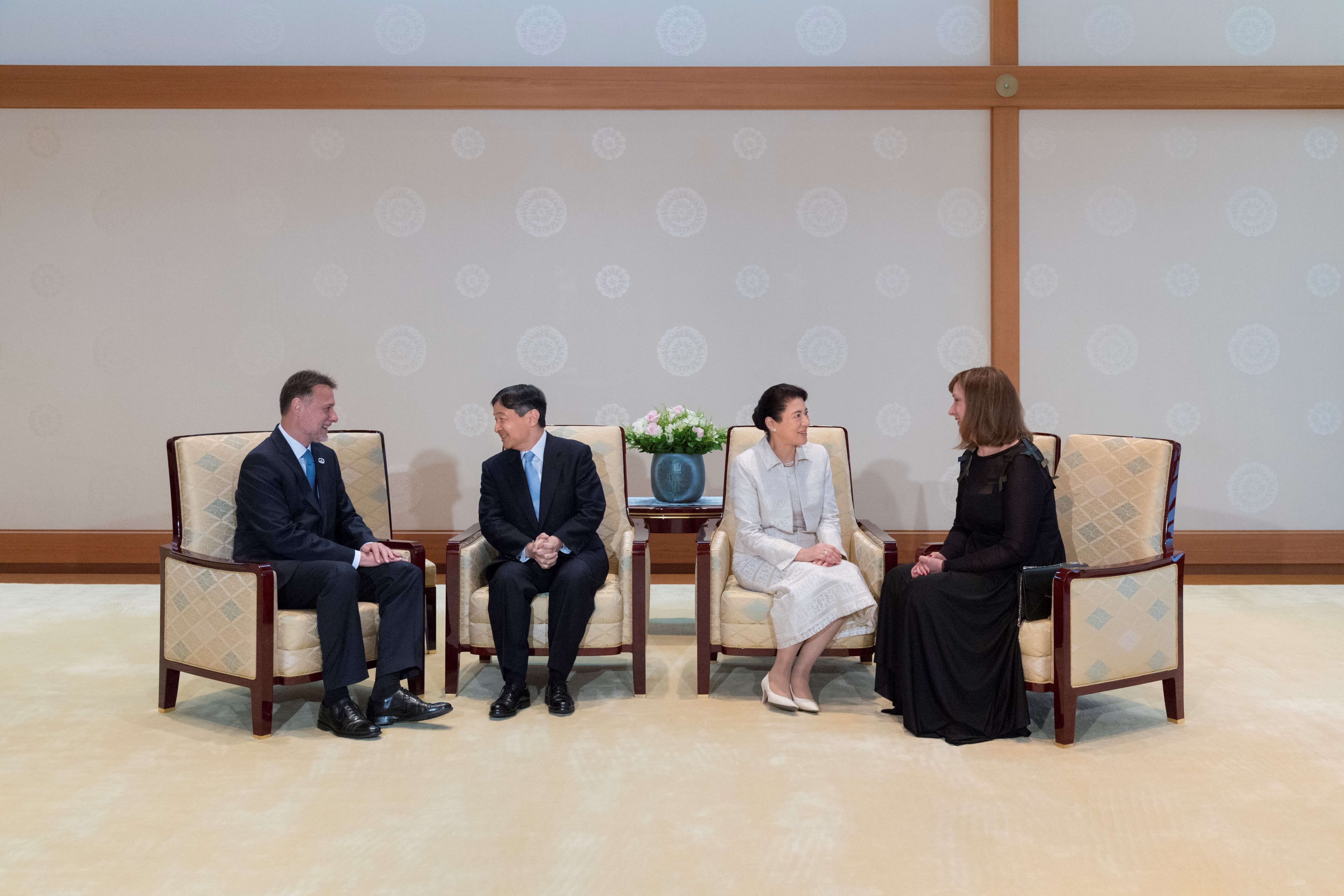
The Emperor and Empress of Japan grant an audience to the Speaker of the Croatian Parliament Gordan Jandroković and Mrs Jandroković during their visit to Japan upon the invitation of Speaker Oshima of the Japanese House of Representatives, June 2019 © The Imperial Household Agency
Kaji also pointed out that Croatia is pretty prevalent in Japan thanks to its sporting heroes. ''Everybody knows who Modrić and Čilić are; Croats are disproportionately present in world sport,'' she said.
Ambassador Kaji also rates Croatian EU membership as a great advantage.
''Through the EU, you're very well represented. When Croatia held the European Council Presidency during the first half of 2020, one of the most important parts of Croatian foreign policy concerned the Western Balkans and you advocated the EU's perspective for them as we don't want to roll back into a conflict or the changing of the borders after such a great sacrifice,'' Ambassador Kaji stated, referring to the war back in the '90s.
An important instance of that is the Zagreb Declaration from June the 22nd, 2020.
''We're part of the group that supports the European idea, and through that, the Croatian idea, as we share the same values,'' confirmed the Ambassador.
She added that while it may seem far away, the issues of the Balkans are relevant to such ideas like the Free and Open Indo-Pacific, and advocating the peace and freedom of nagivation, for example, is required on both locations, and Japan sees Croatia as a partner in that regard.
Ambassador Kaji also regularly contacts the Croatian Ministry of Foreign and European Affairs (MVEP), the Government, Parliament, the President's office, various cultural institutions, sports institutions such as the Croatian Judo Federation, the Croatian Karate Union, and the Croatian Olympic and Paralympic Committees, educational institutions, local government units and more. She also works on maintaining friendly ties with other ambassadors and diplomats in Croatia.
''My diplomatic colleagues know that only those who are blessed get to be stationed in Croatia,'' revealed Ambassador Kaji, not hiding her happiness for representing Japan in this Southeastern European country.
She is also particularly excited about going to Virovitica this week since she has never been. The visit is to attend the exhibition on Japanese pottery titled ''Yakishime: Earth Metamorphosis'' which is coming to Virovitica after already having been held in Vukovar and Pula.
Commenting on the most frequent contact she keeps in Croatia, she said that it's very hard to say, but statistically, maybe the Japanese Embassy communicates the most with MVEP. ''We're only two minutes away from the Ministry,'' said Ambassador Kaji.
Of course, not everything can be equally balanced and trade is unfortunately currently sitting on pretty low branches of the overall tree.
''When it comes to trade, we made up only 0.28% of Croatia's exports with tuna being a major portion - which is nice. In addition, when it comes to investments in Croatia, only 0.5% of all investments come from Japan. So there's room for improvement there,'' stated Ambassador Kaji with optimism.
Some of the instances of trading and business between the two countries can be seen in the Japan-based company Nipro taking over Piramida, a Croatian pharmaceutical packaging producer from Sesvete near the City of Zagreb last month.

A visit to Nipro PharmaPackaging Croatia, June 2021 © Japanese Embassy Croatia
Knowledge – the way forward while not forgetting culture or tradition
As mentioned, Japanese culture is widely popular and much loved among Croats, the Japanese love Croatian athletes, and the two countries share friendly relations. Both Croatia and Japan have their traditions and cultural heritage. With ever-present technological development, some people in Croatia do fear that progress will lead to Croats forgetting their traditions, ways, and cultural heritage. On the other hand, Japan has seen huge technological development evident in very fast internet, modern trains, robotics, and more. Yet, their tradition and culture remain well preserved. What's the secret, and how can technological advancement be balanced with keeping a focus on tradition?
As Ambassador Kaji explained, the gist is to ''keep your spirit, but introduce technology''. While the Ambassador believes that the path of economic development makes sense in the long term, it wasn't always so easy. In the past, economic development was accompanied by pollution, and Japanese people, apart from developing health issues, entered an atmosphere that wasn't very kind to their traditional ways. But things have improved since then.
''In the 21st century, people and governments are more focused on green technologies and digital technologies which can be friendly towards and resonate with keeping up with traditions. Like when drinking tea, you have a ceremony, but the leaves for the green tea need to be carefully nourished in a kind environment, so that isn't very compatible with mass production or polluted air. But when, for example, you use the wind to produce energy, that's a nice eco-friendly way that co-exists with traditional culture,'' explained Ambassador Kaji.
She added that this way of co-existing then becomes mutually supportive and crafted to be resilient and long-lasting. That being said, new technologies also need to be carefully crafted to keep an eye on traditions, and improvisation is troubling in that regard.
''If you show respect for tradition, and you use academic knowledge or research, then there must be a way of remaining aligned with tradition and pursuing technology to have them both be mutually supportive,'' concluded Ambassador Kaji, and her belief about Croatia's technological development is that it will not be fatal to Croatian tradition.
Speaking of tradition, traditions form habits that then become accepted in various societies. With the already mentioned Japanese love for punctuality and the general perception of the Japanese as organised people that like order and plans, the perception of Croats can be quite the opposite. Many see Croats as laid back and relaxed, not making a fuss if they are a bit late. However, Ambassador Kaji sees a different picture of the Croats from her experience, particularly when it comes to Croatian women.
''A cleaning lady from Slavonia that comes to clean my office every day just starts working and cleans meticulously. She doesn't leave one small thing out and she is very responsible. In Japan, you don't see so many women gardening, and here, the women that watch over my garden are very powerful and professional, and that is very impressive,'' she noted. The work ethic and responsibility are something she sees with all of the Croats working for her.
''When it comes to Japan, we plan for perfection, so the dark side of that characteristics is, for instance, being late with the vaccination rollout. There are all sorts of verifications that take place there, making sure everyone can get them, and yes, they're proven safe abroad, but we had our own evaluations done, and that was the main reason we've been criticised for being too slow. Here in Croatia, you're really good at improvising. We can learn from each other,'' Ambassador Kaji said, sharing her observations on the habits of Croats and people in Japan.
She added that one such thing where Croatia can learn from Japan is crisis response, particularly when it comes to earthquakes.
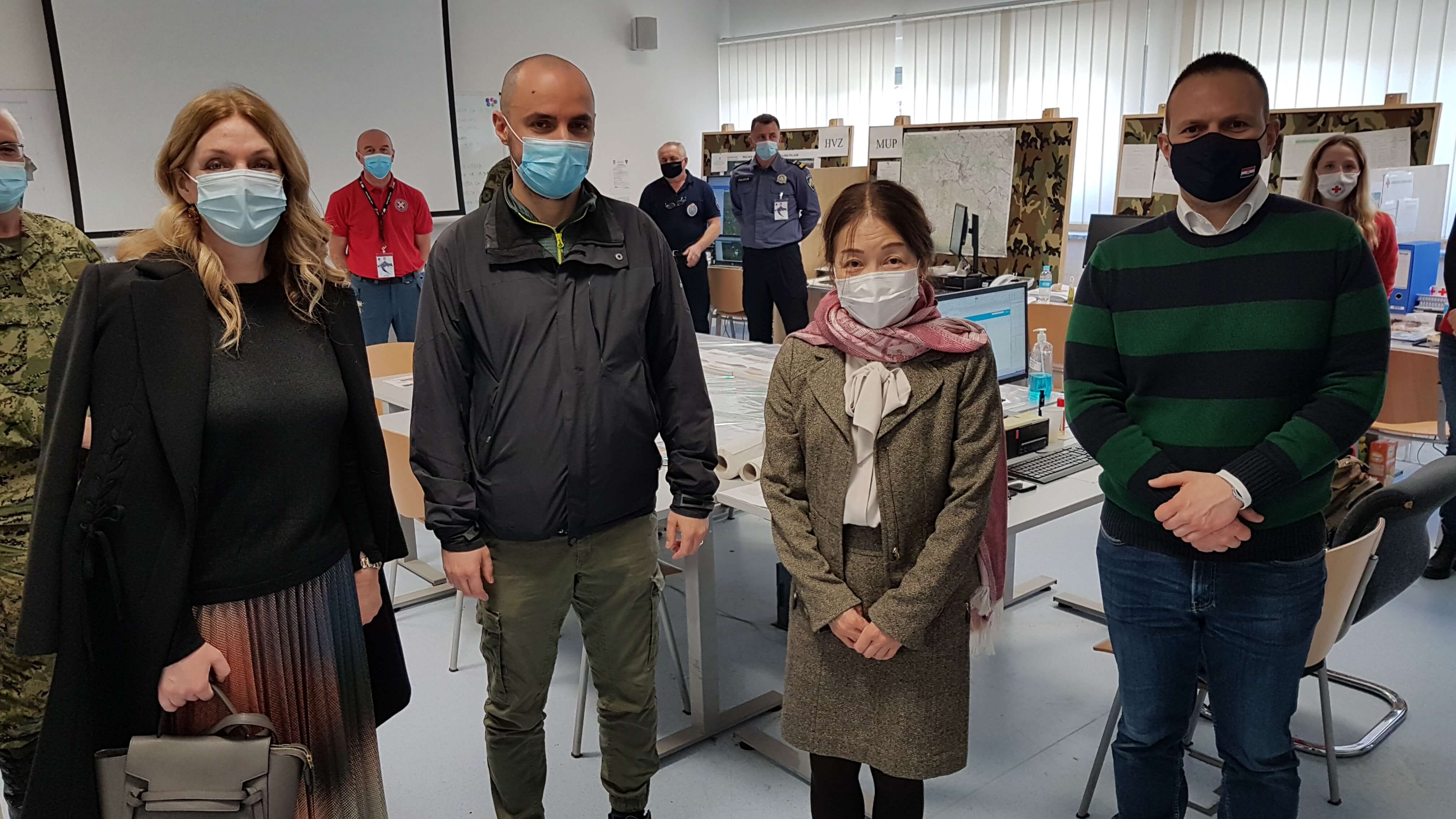
At the Civil Protection Headquarters for Dealing with the Aftermath of the Petrinja earthquake in December 2020, March 2021 © Japanese Embassy Croatia
Post-earthquake reconstruction by Japanese experts: Zagreb's buildings can keep their looks and also become safer
Japan is famous (or as Ambassador Kaji rated with a humorous touch, perhaps notorious) for regularly having earthquakes. Tsunamis happen as well. This was even noticed by reporters from the Croatian paper Jutarnji List, who, when following the earthquakes in Zagreb and Petrinja, interviewed Ambassador Kaji in search of advice on living with earthquakes. An equipped backpack with water, food, batteries, and lights ready for evacuation, along with agreeing on a location at which were to meet with your loved ones, are some great bits of advice for planning once you accept that earthquakes can happen at any time, anywhere.
''You can't stop earthquakes, but if you're prepared, you can mitigate the damage they cause and protect lives. People often think earthquakes happen, and that's that, but earthquakes are never over,'' said the Ambassador when recalling that interview.
''I was at my residence when the Zagreb earthquake happened more than one year ago, and the epicentre was just three kilometres away. It was pretty bad but not serious with only small cracks on the wall,'' recalled Ambassador Kaji, not seeming to feel unsafe in a Japanese earthquake-conscious building, while Croatia isn't always so aware that the Earth's plates can move and cause total chaos.
The earthquake that gave Zagreb such a heavy blow in March 2020 is a normal monthly, if not weekly, occurrence in Japan. The country's ultra-modern buildings and skyscrapers were built to sustain such rumbling, but even the traditional signature Japanese style of architecture (such as the signature Pagoda of Horyuji, the oldest wooden high-rise Japanese building built in 680A.D.) sustained numerous earthquakes over centuries, as Japanese builders always had to try to cope with earthquakes. But, with Zagreb being proud of its architecture, particularly in the downtown area, can the Croatian capital possibly preserve its signature look but also become safer for its residents if such magnitudes or higher strike once again?
''I asked some Japanese experts about whether or not it would be possible to preserve the nice, historic architecture of Zagreb and not just totally transform it into a modern but very common city, and they said it was possible. That needs investment, but there are ways to somewhat reinforce the basic structures and preserve their looks,'' assured Ambassador Kaji. She also added that the speed and focus of reconstruction is something Croatia can learn how to be better at from Japan.
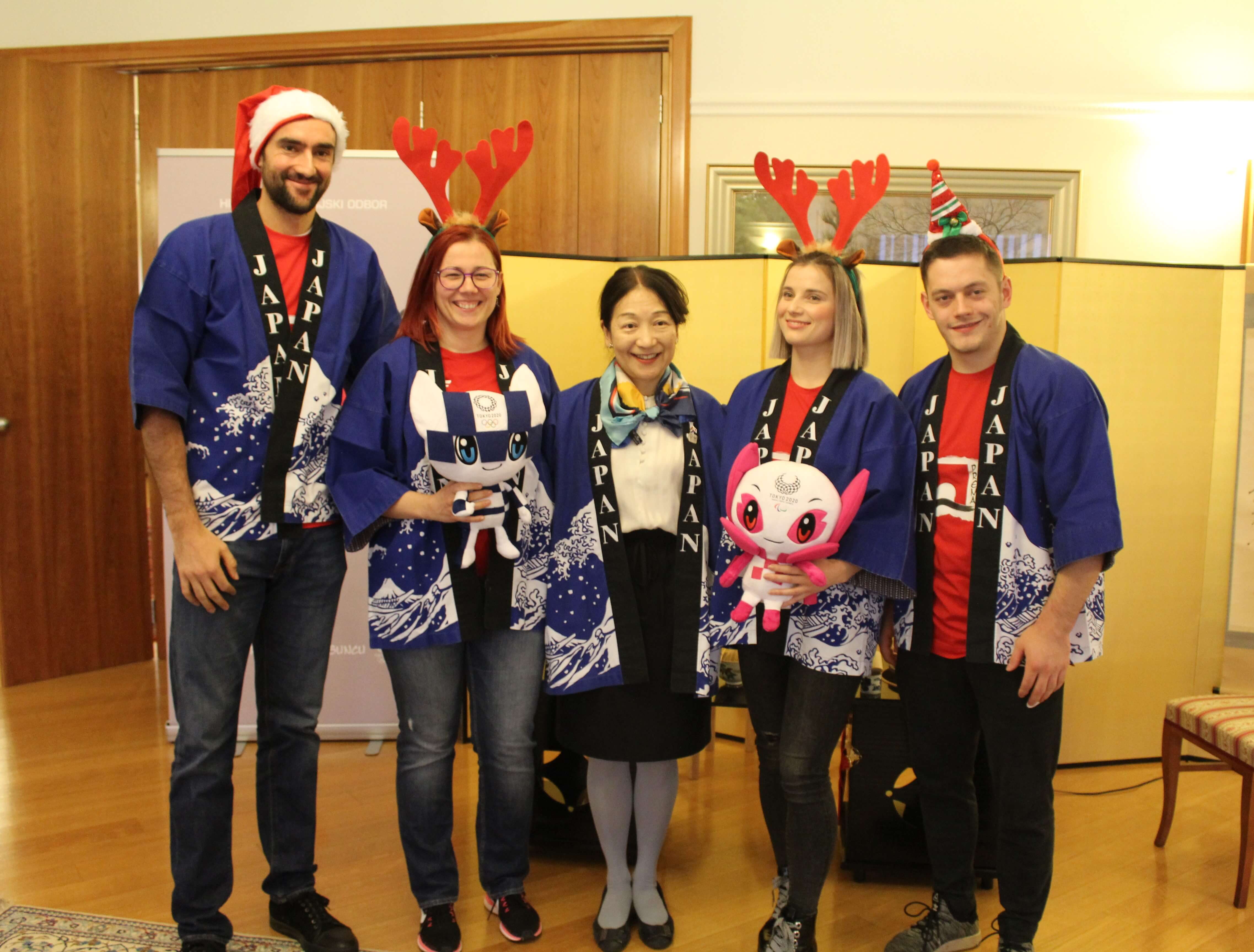
Towards the Tokyo 2020 Olympic and Paralympic Games, December 2019 © Japanese Embassy Croatia
The Adriatic is nice, but UNESCO heritage really excites Japanese people
With data acquired before coronavirus, Ambassador Kaji stated that there were 150 Japanese nationals living in Croatia, and 150,000 Japanese tourists visited the country. What several people noticed was that while many foreigners come to Croatia primarily to enjoy the coast and swim in the Croatian Adriatic, Japanese tourists can rarely be seen on the beach and prefer sightseeing.
''Japan is surrounded by the sea, so the sea isn't something amazing to them, but Japanese people are very interested in cultural heritage, and when something is recognised by UNESCO, people in Japan really rejoice. So, the Japanese are very much interested in historical or artistic values Croatia offers,'' explained Ambassador Kaji, clarifying why so many Japanese tourists can often be seen as frequently in continental Croatian towns and cities and not just on the coast.
Despite some Croats sometimes being a bit xenophobic or looking differently at people of other races, Ambassador Kaji was surprised when asked about whether there were any racial issues that Japanese people experienced and reported in Croatia.
''I don't know if things were different before regarding racial issues, but the story I heard when I came to Croatia was that back in 2011, many Croats gathered in front of the Embassy of Japan with flowers, candles, and cranes to express their grief and support regarding the Fukushima Tsunami and the earthquake,'' said Ambassador Kaji.
Just like those who came with flowers, the Embassy is equal and open, too. The Embassy issues scholarships for people wanting to study in Japan twice a year, and apart from being open to anyone that wants to travel to Japan and get informed about the country and visa requirements, the Embassy also has a library people are welcome to come to and read through Japanese books and literature.
Apart from being in regular contact with other colleagues based in Croatia, Ambassador Kaji also regularly contacts the Croatian Ambassador in Japan, Drazen Hrastic.
''Before I left Tokyo, we had dinner together, and now we talk often, as well,'' said Ambassador Kaji with a smile.
With Japanese culture being so appreciated in Croatia, and Croatian sporting heroes and UNESCO heritage being so beloved in Japan, spiced with common political values and friendly diplomatic relations, Croatia and Japan truly have the chance to learn from each other and continue to work on the further nurturing of their diplomatic ties, and their shared trade.
If you're a Japanese citizen or a Croatian citizen in need of information, here is how you can reach a Japanese diplomatic mission in Croatia:
In Zagreb:
Japanese Embassy
Adress: Boškovićeva 2
Mail:
Consular Section: This email address is being protected from spambots. You need JavaScript enabled to view it.
Political Section: This email address is being protected from spambots. You need JavaScript enabled to view it.
Economic Section: This email address is being protected from spambots. You need JavaScript enabled to view it.
Section of Culture / Public Relations: This email address is being protected from spambots. You need JavaScript enabled to view it.
Phone number: +385 1 48 70 650
In Split:
Consulate Office
Adress: Marasovićeva 67
Mail: This email address is being protected from spambots. You need JavaScript enabled to view it.
Phone number: +385 21 32 35 80
And of course, you can find all the latest news concerning Japanese-Croatian relations on the official website.
To read more from the series "Friends of Croatia", follow TCN's dedicated page.
For more about Japan - Croatia relations, follow TCN's dedicated page.
Croatian Shot Putter Filip Mihaljević Wins Bronze at European Indoor Championships
ZAGREB, 6 March, 2021 - Croatian Filip Mihaljević grabbed a bronze medal at the European Athletics Indoor Championships in the Polish city of Torun on Friday evening, with a throw of 21.31 metres.
Czech Republic’s Tomas Stanek became the European champion with his fifth round mark of 21.62m, while home favourite Michal Haratyk finished second with a throw of 21.47 metres. Polish Haratyk is the current European track and field outdoor champion in the shot put event.
Mihaljević is now the second Croatian track and field athlete to win a medal at European indoor championships. Before him it was runner Branko Zorko with a bronze medal in the 1,500 metre race at the 22nd European Athletics Indoor Championships in Genoa, Italy, in 1992, and a silver two years later in Paris in the same event.
World Class: New Dubrovnik Sports Hall For 2025 World Handball Comp
February 4, 2020 – The new Dubrovnik Sports Hall will have world-class facilities and be multifunctional, capable of holding cultural events as well as sports. It will be completed in time for the city joint hosting the 2025 World Handball Championship
The City of Dubrovnik has revealed plans for a new world-class Dubrovnik sports hall. The venue will have ultra-modern facilities and will be a multifunctional space, allowing it to be also used for cultural events such as music concerts. The city will apply for European funds to help pay for the new Dubrovnik sports hall.
In February 2020 it was announced that Dubrovnik would be one of the hosts of the World Handball Championship in 2025. The announcement and impending visit of the competition is the impetus for launching the project of the new Dubrovnik sports hall. Croatia is one of three countries - alongside Denmark and Norway - that will jointly host the World Handball Championships in 2025.
The new Dubrovnik sports hall is planned as a multifunctional sports and congress hall and cultural centre, which will sit next to the existing sports hall in Gospino polje. The old hall and the new Dubrovnik sports hall will be connected, creating a venue capable of holding some 4200 spectators. It will be a complex containing three handball courts for competition or recreation, alternatively to be used as a congress hall or for music concerts, at which the capacity would be 4000 guests.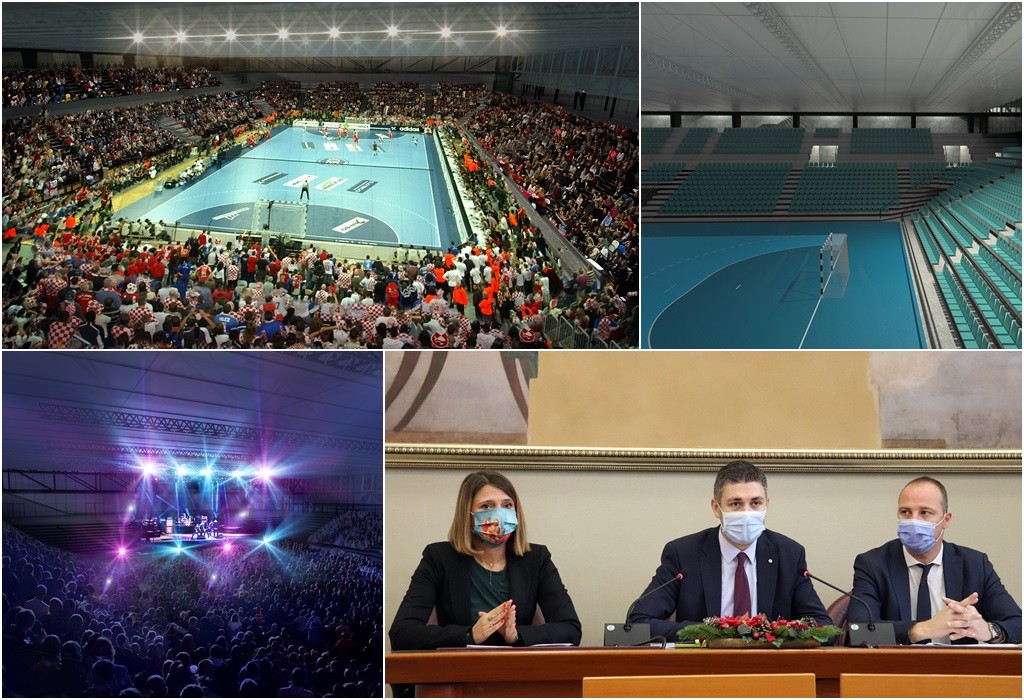 © Grad Dubrovnik
© Grad Dubrovnik
Plans for the new Dubrovnik sports hall were presented jointly by Mayor Mato Franković, Head of the Administrative Department for European Funds, Regional and International Cooperation Zrinka Raguž and Director of the Sports Facilities Dubrovnik Lukša Klaić. The city aims to obtain building permits by the end of 2021 and complete construction by the end of 2024.
For the latest travel info, bookmark our main travel info article, which is updated daily.
Read the Croatian Travel Update in your language - now available in 24 languages.
Majority of MPs Support CoE Convention on Safety, Security and Service in Sport
ZAGREB, September 18, 2020 - Members of the Croatian Parliament on Friday supported the Council of Europe's Convention on an Integrated Approach to Safety, Security and Service at Football Matches and Other Sports Events.
Presenting the document, the interior ministry's State-Secretary, Zarko Katic, said that incidents occurred too frequently at football matches as a consequence of poor security management at stadiums.
"Violence is on the rise both inside stadiums and outside as well as in city centres," Katic said.
The purpose of the Convention is to ensure that football and other sports events provide a safe, secure and welcoming environment for all individuals through the implementation of an integrated approach on safety, security and service at sports events by a plurality of actors working in a partnership amid an ethos of co-operation.
However, Marko Milanovic Litre of the Homeland Movement (DP) bench said that he saw the adoption of the Convention as the continuation of rigorous, unjust and discriminatory policies towards a social minority (football fan groups), who he said, demonstrated fairness and integrity and well as unselfish commitment at local and national levels. This DP deputy criticised the practice of keeping records of citizens who attend football events at stadiums as something that can undermine individual rights and freedoms.
the Council of Europe's Convention on an Integrated Approach to Safety, Security and Service at Football Matches and Other Sports Events, which was adopted in Saint-Denis on 3 July 2016, took effect on 1 November 2017.
To date 33 members of the Council of Europe have signed the document, and 16 of them have ratified it.
For the latest travel info, bookmark our main travel info article, which is updated daily.
Read the Croatian Travel Update in your language - now available in 24 languages
Best Athletes in Split Awarded at Museum of Croatian Archaeological Monuments
March 6, 2020 - At the Museum of Croatian Archaeological Monuments, the Split Sports Federation officially proclaimed the winners of the Annual Award, this time for 2019, which is a long-standing tradition of this umbrella sports association in the city of Split.
Dalmacija Danas reports that in the presence of many people from the sports, cultural and social milieu of Split, the ceremony was opened by Neno Periš, President of the SSŠ, Mate Omazić, Mayor for Social Affairs of the City of Split and Envoy of Mayor Andro Krstulović-Opara and President of the City Council, Igor Stanišić.
It was followed by a song by Klapa Šufit and soprano Ivana Bosančić Lasić, accompanied by Zoran Velić on piano.
The selection of all the winners was made by the Executive Board of SSŠ at the proposal of the Awards Committee.
In the competition of eight nominated female athletes, Klara Kovač of the Taekwondo Club Marjan was selected as the Most Promising Female Split Athlete for 2019, after winning 2nd place at the European Championship for the younger seniors up to 21 years in the 53 kg category. In addition to the award, Klara received a laptop as a donation from the Faculty of Kinesiology in Split.
The most promising male Split athlete for 2019 was Franko Grgić from the Jadran Swimming Club, in the competition of five nominated athletes. Franko Grgić won 2 gold medals in the 1500 and 800 m freestyle at the World Junior Championships. He set the world junior record in 1500m freestyle. At the European Youth Olympic Games (EYOF) he won 2 gold medals in the 1500m and 400m freestyle. He sailed 2 Olympic standards for the Tokyo 2020 Olympic Games (1500 and 800 m freestyle). He placed 2nd in the selection for the International Piotr Nurowski Award for Best Young European Athlete in 2019 in the selection of the European Olympic Committees. He won 2 Drazen Petrovic awards from the Croatian Olympic Committee: for the greatest hope of Croatian sport and for the most successful young athlete in 2019. Franko Grgić also received a laptop as a gift from the Faculty of Kinesiology in Split.
In the competition of four nominated teams for the best Split women's team for 2019, the Split Women's Football Club was selected, who won the championship and the Croatian Cup.
For the best Split men's team for 2019, the Executive Board decided to select two teams out of four nominees. For the third time in a row, the Mertojak Bowling Club was selected as the best men's team, after winning the Europa Cup for the second consecutive time and reaching the quarter-finals of the Champions League (and again this year in the continuation of the competition and in the semi-finals, scheduled for March 28 in Apatin). They won the Croatian Cup and the 2nd place in the Croatian Championship. In addition to Mertojak, the water polo club Jadran, who placed 3rd place in the Croatian Championship and was the semi finalist of the Croatian Cup, was named the best men's team. They also placed 11th in the Champions League group stage.
For the best coach of the women's and men's categories in the competition of 10 (female) and 9 (male) nominated candidates, Toni Tomas, coach of Taekwondo Club Marjan, was named the winter.
The Executive Board of the Split Sports Association of Disabled Athletes selected Anđela Mužinić as the best female athlete, who is a member of the NEC Split table tennis club, which won 3rd place individually and was the 1st place team at the European Table Tennis Championship, while Dino Sinovčić was selected as the best male athlete and is a member of the Cipal Swimming Club. Dino won 1st place in the 100m backstroke.
At the end of this remarkable sporting event, the best athlete and athlete of the City of Split was declared for 2019.
In the competition of 11 nominated athletes, Matea Jelic of the Taekwondo Club Marjan was named the best female, after qualifying for the Olympic Games in Tokyo 2020. She won 3rd place in the European Championship in the category up to 67 kg and won 1st place in the final in China. She finished the year in 3rd place in the Olympic rankings and in 2nd place in the world rankings.
The best male comes from Marjan Taekwondo Club - Toni Kanaet. Toni qualified for the Tokyo Olympics in 2020. He won 2nd place in the European Championship in the 80 kg category. Only six of the top 2074 athletes in that category were placed in the Olympic Games category.
To read more about sport in Croatia, follow TCN's dedicated page.


